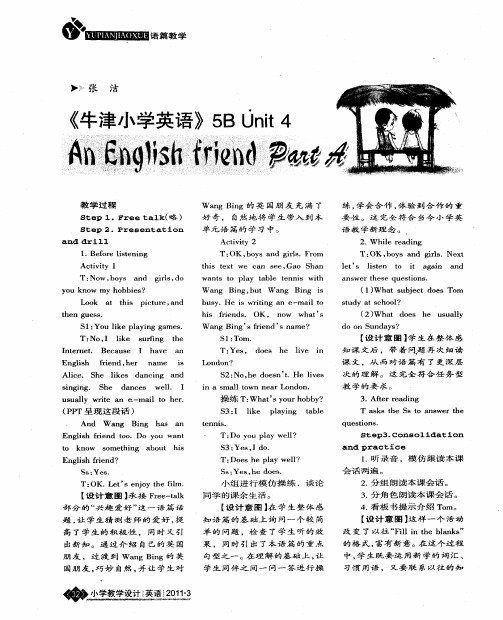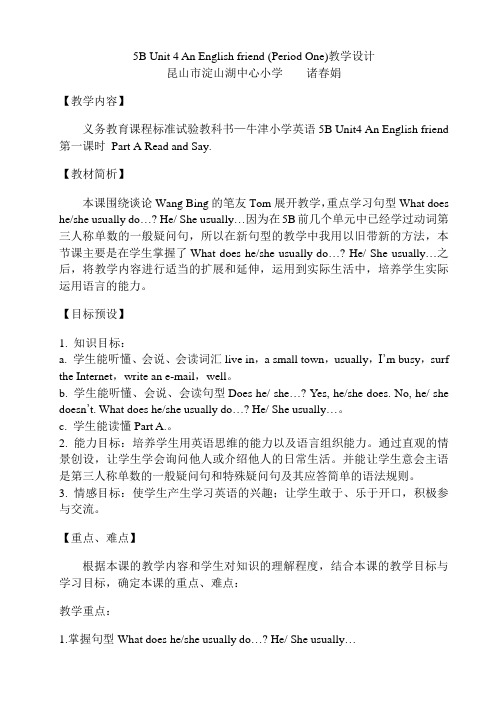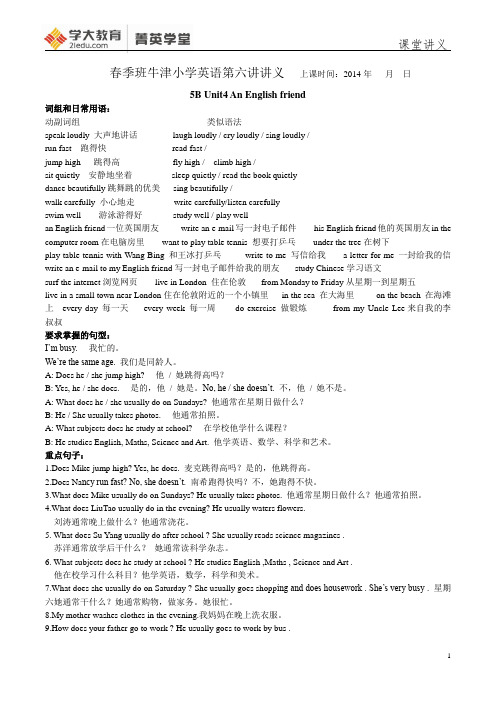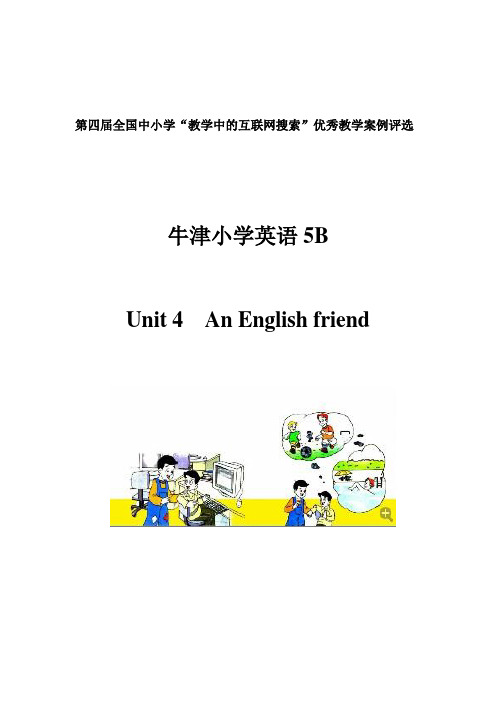5BUnit4
- 格式:doc
- 大小:42.50 KB
- 文档页数:6

5年级下册Unit 4A卷: 课堂点拨题1.对疾病提问:What’s wrong with you? 你怎么了?(1) What’s wrong _____? A. with her B. with he C. with she(2)【易错】What’s wrong with ___________ mother? A. he B. his C .himA: What’s wrong with ? B: They a cold. A. him, have B. them, have C. her, have (3)【易错】放学了,让我们去弄点吃的。
School is . Let's something to .2.疾病的表达(1)Oh, you’ve got a headache, _____ some medicine, please. A. take B. taking C. to take D. Take(2)--I’ve a fever. -- _______. A. I’m sorry to hear that. B. Great! C .Thank you.3. 情态动词should的用法(一)肯定句(1)You should (brush) your teeth. He (brush)his teeth every day.(2)My mother _______ her legs. A. hurts B. hurt C. is hurts(二)否定句(1)Should Mike take_____ medicine, doctor? No, he _____. A. any; should B. some; should C. any; shouldn’t(2)You shouldn't eat ice creams. A.too much B.many too C.too many(3)Nancy shouldn’t (take) any medicine.(三)一般疑问句(四)特殊疑问句(1)Why _____ he ____ a toothache? A. does; has B. does; have C. do; have D. do; has(2)--How your parents,Lily?-- fine. A.do;They're B. are;They're C. are;They(3)【易错】—Why_______ Yang Ling _______(go) to bed so early? —Because she is ill.(4)She should do her homework first. (对划线部分提问)4. some 和a lot of + 可数/不可数;many + 可数复数;much + 不可数(1)Are you taking _____ medicine? A .some B. any C. many(2)You shouldn’t eat too _______(much) sweets.5. “something和anything” 的用法类似“some 和any”(1) I can’t drink _______. A. anything B. something C. any D. some(1)【易错】Is there _______ (something) interesting in this book?6. 这课里的一些短语和句型(1)They should brush _____ teeth. A. they B. their C. them(2)She _____ see ____ doctor. A. goes; the B. goes to; / C. goes to; the D. goes; /(3)The boy ________that big fish. A. points on B. point to C. point atB卷: 课后巩固题一.选择( )1.【易错】--Where's Nancy?--She is bed. A.stays at B. stay on C. staying in ( )2.-- your mother ill?--Yes,she . A.Does;does B.Is;is C.Are;am ( )3.You’ve got a ______ cold. A. bad B. good C. too( )4.--______ you cold?--No,I'm _______. A.Do;hot B.Are;hot C. Are;cold( )5.My brother shouldn’t take medicine. A. some B. any C. many( )6.—I’m thirsty. —Here’s a glass of juice ____ you. A. give B. of C. for( )7.He lives City Park Station. A.in B.on C.at( )8.Shall we the station by car? A.go to B.goes C.go二.填入适当的词1.tooth (复数形式) ______2.brush (第三人称单数) ______3.her (主格) ______4. them (主格) ______5.on(反义词) ______6.it(宾格) ______7.you(主格) ______8.full(反义词) ______9.【易错】I’m very happy_________(see)you.10.Elephants come to see _________(they).11.Yang Ling does not _______(feel) hungry. She _______(feel) thirsty.12.Please _______(drink) some warm water.13.—What’s the matter with _______(she)? —She has a __________(head).14.What (不应该) they do?15.—What should he _______(do)? —He should ________(brush) his teeth.16.She should take some __________(medicine).17.The old man can't do _______ (something).三.翻译1.看医生2.吃太多糖3.喝太多水4.就寝前5.喝一些温水6.刷牙7.吃一些药8.喝一些暖水9.患牙疼10.给我看他的自行车11.在医院附近12.乘地铁去医院13.听清楚14.指着15.他们怎么啦?他们生病了。


5B Unit 4 An English friend (Period One)教学设计昆山市淀山湖中心小学诸春娟【教学内容】义务教育课程标准试验教科书—牛津小学英语5B Unit4 An English friend 第一课时Part A Read and Say.【教材简析】本课围绕谈论Wang Bing的笔友Tom展开教学,重点学习句型What does he/she usually do…? He/ She usually…因为在5B前几个单元中已经学过动词第三人称单数的一般疑问句,所以在新句型的教学中我用以旧带新的方法,本节课主要是在学生掌握了What does he/she usually do…? He/ She usually…之后,将教学内容进行适当的扩展和延伸,运用到实际生活中,培养学生实际运用语言的能力。
【目标预设】1. 知识目标:a. 学生能听懂、会说、会读词汇live in,a small town,usually,I’m busy,surf the Internet,write an e-mail,well。
b. 学生能听懂、会说、会读句型Does he/ she…? Y es, he/she does. No, he/ she doesn’t. What does he/she usually do…? He/ She usually…。
c. 学生能读懂Part A.。
2. 能力目标:培养学生用英语思维的能力以及语言组织能力。
通过直观的情景创设,让学生学会询问他人或介绍他人的日常生活。
并能让学生意会主语是第三人称单数的一般疑问句和特殊疑问句及其应答简单的语法规则。
3. 情感目标:使学生产生学习英语的兴趣;让学生敢于、乐于开口,积极参与交流。
【重点、难点】根据本课的教学内容和学生对知识的理解程度,结合本课的教学目标与学习目标,确定本课的重点、难点:教学重点:1.掌握句型What does he/she usually do…? He/ She usually…2.理解课文内容,流畅的朗读课文。

Unit 4 备课笔记单词1.e-mail n.电子邮件write an e-mail 写一封电子邮件2.busy adj.忙的be busy 忙碌的3.town n.城镇live in a small town 住在一个小镇上ually adv.通常5.well adv.好的play well 玩得很好6.fast adv.快地adj 快的run fast 跑得快7.high adv.高地; adj高的jump high 跳得高8.from 从;来自from….to…..从….到…..9.surf v.浏览surf the interrnet上冲浪10.Loudly adv.大声地speak loudly 大声地讲话词组speak loudly 大声地讲话laugh loudly / cry loudly / sing loudlyrun fast 跑得快read fast /jump high 跳得高fly high / climb high /sit quietly 安静地坐着sleep quietly / read the book quietly dance beautifully跳舞跳的优美sing beautifully /walk carefully 小心地走write carefully / listen carefullyswim well 游泳游得好study well / play wellan English friend一位英国朋友write an e-mail写一封电子邮件his English friend他的英国朋友in the computer room在电脑房里want to play table tennis 想要打乒乓play table tennis with Wang Bing 和王冰打乒乓write to me 写信给我write an e-mail to my English friend写一封电子邮jiana letter for me 一封给我的信surf the internet浏览网页live in London 住在伦敦live in a small town near London住在伦敦附近的一个小镇里study Chinese学习语文from Monday to Friday从星期一到星期五every day 每一天every week 每一周under the tree在树下in the sea 在大海里do exercise 做锻炼on the beach 在海滩上from my Uncle Lee来自我的李叔叔二.句子1. Does Mike jump high? Yes, he does.麦克跳得高吗?是的,他跳得高。

春季班牛津小学英语第六讲讲义上课时间:2014年___月__日5B Unit4 An English friend词组和日常用语:动副词组类似语法speak loudly 大声地讲话laugh loudly / cry loudly / sing loudly /run fast 跑得快read fast /jump high 跳得高fly high / climb high /sit quietly 安静地坐着sleep quietly / read the book quietlydance beautifully跳舞跳的优美sing beautifully /walk carefully 小心地走write carefully/listen carefullyswim well 游泳游得好study well / play wellan English friend一位英国朋友write an e-mail写一封电子邮件his English friend他的英国朋友in the computer room在电脑房里want to play table tennis 想要打乒乓under the tree在树下play table tennis with Wang Bing 和王冰打乒乓 write to me 写信给我 a letter for me 一封给我的信write an e-mail to my English friend写一封电子邮件给我的朋友 study Chinese学习语文surf the internet浏览网页live in London 住在伦敦from Monday to Friday从星期一到星期五live in a small town near London住在伦敦附近的一个小镇里in the sea 在大海里on the beach 在海滩上every day 每一天every week 每一周 do exercise 做锻炼from my Uncle Lee来自我的李叔叔要求掌握的句型:I’m busy. 我忙的。

第四届全国中小学“教学中的互联网搜索”优秀教学案例评选牛津小学英语5BUnit 4 An English friend一、教学背景1、面向全体学生:小学五年级学生2、学科:小学英语3、课时:14、课前准备:(1)通过百度网站收集有关句容和London风貌图片及QQ与MSN电子邮件的有关知识资料(2)通过百度网站查找歌曲视频(3)准备课件、录音机、磁带、单词卡片二、教学课题牛津小学英语5B Unit 4 An English friend三、教学目标【知识目标】1.能正确地理解、掌握对话内容,并能朗读、表演对话。
2.能正确地听、说、读写单词:e-mail, Internet, busy, well, town, usually.3.能初步掌握句型:What does he/she usually do on...? He/She usually...以及Does...? Yes, ...does./ No, ...doesn’t.【能力目标】1.通过本课学习,学生能在掌握重点句型的基础上培养实际运用语言的能力。
2.能正确地运用对话中的日常交际用语:Let go and play...和come in,I’m busy.等词句。
3.培养听、说能力和交际能力。
【情感目标】1.体验学习、参与、合作的乐趣。
2.树立大胆说英语的信心,激发在生活中乐于使用英语的兴趣。
3.培养乐意交友的情感态度,通过互相介绍自己的朋友,树立大胆说英语的信心。
四、教材分析《牛津小学英语》5B Unit4 An English friend A板块课文以Gao Shan向Wang Bing询问Tom的一些情况而展开话题,在介绍朋友的同时,重点引出主语是第三人称单数的一般疑问句和特殊疑问句及其回答Does he/she...? Yes,he/she does. No, he/she doesn’t. What does he/she usually do...? He/Sheusually... 让学生在尽可能真实的情境中,灵活运用所学的知识。
1. What’s wrong with you? 你怎么了?I have a headache. I feel cold. 我头疼。
我感觉冷。
3. What should I do? 我应该怎么做?You should have a rest at home. 你应该在家休息。
5. You should take some medicine and drink some warm water.你应该吃些药,喝些温水。
6. He goes to see the dentist. 他去看牙医。
7. I can’t eat anything. 我不能吃任何东西。
8. You should brush your teeth in the morning and before bedtime. 你应该在早晨和睡前刷牙。
9. How do you feel now? 你现在感觉怎么样?10. Can you help me? 你能帮助我吗?11. Giraffe points at his long neck. 长颈鹿指着他的长脖子。
12. Why does he have a toothache? 他为什么牙疼?13.Charlie is sitting on a bench.查理正坐在一个长凳上。
14.He’s going to China in March.他将要在三月去中国。
15.Your temperature is 102°F.你的体温是102华氏度。
(美国等少数英语国家用华氏度)1. 询问某人身体状况的基本句型。
(1) What’s the matter (with...)?= What’s wrong with ..(+人称代词宾格)I/We/They have...... 我/我们/他们患了.... He/She/It has 他/她/它得了......(2) How do you feel now? 你现在感觉怎么样?I feel.... 我感觉...2. What should +人称主格(he/she/we/they)? (Shouldn’t=should not)注:can,should,would, 情态动词,本身不变,后面动词也不变。
5B Unit4 seeing the doctor教学反思今天我在五2班进行了三月份的视导课,执教的是5B Unit4—Seeing the doctor.
首先,在导入环节,我以一首歌曲引入,带着学生以手指代替牙刷,边唱歌边跟着做动作,活跃课堂气氛,引入课文相关内容。
接着,我带领学生一起玩了两个小游戏,“say it or no”和“read and guess”,在游戏过程中渗透本课的新单词和句型。
其次,presentation环节,我出示苏海和迈克的图片,让学生尝试自己用wh的单词提问。
课文渗透环节以一看二听三读的步骤对课文进行一步步的梳理,完成新课的教授。
Production环节,让大家两人一组,选择自己喜欢的方式读课文或表演课文。
适当的加上动作增加环节趣味性。
最后的拓展环节,我创立情景,以自身和学生做患者和医生为例,让学生在本课基础上编排新的对话,实现知识点巩固和创新。
课后,董老师对我的课程进行了指导,主要有以下几点:
语速过快,稍显不清楚,可以放慢速度与学生交流沟通。
少了情感升华环节,应就本课课题和学生探讨如何养成良好习惯以防止生病看医生。
拓展环节可增加绘本,增加亮点。
通过这一次的视导课,我又学习到了一些进步,希望可以在今后的课堂中再接再厉。
Unit4 An English friendTeaching aims:1、Knowledge aims:1) Ss can listen, read, say and write these words: e-mail, busy, well, town, usually.2) Ss can preliminarily master the sentence patterns:——What does he/she usually do…?——He/She usually …——Does he/she …——Yes, he/she does. / No, he/she doesn’t.2、Ability aims:1) Ss can understand the dialogue and then act it out later.2) Ss can write short passages about their friends.3、Emotion aims:Ss can experience the value of having a friend and cherish the friendship. Important aims:1) Ss can listen, read, say and write these words: e-mail, busy, well, town, usually.2) Ss can understand the dialogue and then act it out later.Difficult aims:1) Ss can preliminarily master the sentence patterns;2) Ss can write short passages about their friends.Teaching aids:Multi-media computerTeaching period: The first periodTeaching process:Warm-up (free talk)T: Class begins.S: Stand up.T: Good morning, boys and girls.Ss: Good moring, Miss Liu.T: Okay, children. I am very happy today. Because there are so many visitors here. So let's say"hello, welcome to our class!" okay?Ss: Okay. Hello, welcome to our class.T:Very good. Sit down, please.Well, boys and girls. What are you doing now?Ss: We are having an English class.T: Are you free now?Ss: No, we aren't.T: Are you free from Moday to Friday?Ss: No, we aren't.T: That's right. We go to school from Monday to Friday.So we are very busy. (teach "busy")T: (face to S1)Are you busy on Sundays?Ss: No, I'm not.T: What do you usually do on Sundays?S1: I usually…T: So your hobby is…T: (face to S2)What do you usually do on Sundays?S2: I usually…T: Now, I know his hobby is… and her hobby is…Do you want to know my hobbies?Ss: Yes.T: So please guess what my hobbies are?Now please look at me and listen to me. (T sings a song)S: Your hobby is singing.T: Yes, that's right. I like singing and I can sing well. (sing a song)Do you like singing?Ss: Yes.T: Would you like to sing a song with me?Ss: Yes. (sing a song"hobbies")T: It's great, guys. You all sing very well.T: (face to a S)Do you like playing table table tennis?S: Yes, I do.T: Can you paly well?S: Yes./ NoT: You know, I have other hobbies. Look at this picture, can you guess? Ss: Your hobby is playing computer games.T: Sorry, I don't like playing computer games. Think about it again, please. T: Okay, boys and girls. I can tell you.I like surfing the Internet. (teach"surf the Internet")I usually surf the Internet after school. Do you usually surf the Internet?Ss: Yes.T: You know, I have a lot of friends. I usually write e-mails to them on Sundays. So I like writing e-mails. (teach "write an e-mail")T: Do you want to know my e-mail address? (提示中文“邮箱地址”)Ss: Yes.T: All right. 如果你想要我的e-mial address, 请努力。
Look at here, 这里有16个字符,哪个小组很棒地答对问题,我就会揭示一个字符. 四种颜色代表四个小组。
哪个小组完成任务,就可以获得我的e-mailaddress。
Are you clear?Ss: Yes.T: So please come on, boys and girls.Lead-inT: You know, I have a lot of friends. But I don't have an English friend. Wang Bing likes making friends, too. Does he have an English friend? (出示课题) Presentation:T: Look at this picture.Ss: This is Gao Shan and this is Wang BingT: Where are they?Ss: They are in the computer room.T: That's right.Where are they?What is Wang Bing doing? What does Wang Bing want to do?Now let's watch a cartoon and try to answer these three questions.Ss: (watch the background of the cartoon)T&Ss: Check answers together.T: We know, wang Bing has an English friend. His name is Tom.Do you want to know more things about Tom?Ss: Yes.T: Very good. Now go on watching the cartoon. Tell me what they are talking about?Ss: They are talking about Tom.Ss: Read the dialogue by yourselves in silence and try to answer the questions. T&Ss: Check answers together.T: Now read the dialogue after me.Ss: (Read the dialogue after T)T: Now, stand up, please. Okay, Group1 and Group2 play role of Wang Bing, Group3 and Group4 play role of Gao Shan.Ss: (practice in two big groups)Consolidation:T: Okay, boys and girls. Let's talk about Wang Bing's friend —Tom.Does he live in London?Ss: No, he lives in a small town near London.T: what does he usually do on Sundays? ( 出示句型卡片)Ss: He usually plays football. (card)T: Does he play football well? (card)Ss: Yes, he does. (card)T: Does he swim well, too?Ss: Yes, he does.T: What does he study at school?Ss: He studies English, Maths, Science and Art.T: Does he study Chinese?Ss: No, he doesn't. (card)T: Very good. Now practice with your partner. You can talk about other things about Tom.Ss: (Practice with partner about Tom)T: Now, boys and girls. Take out your exercise paper and pencils. Let's read and write.Ss: (complete the blanks)Gao Shan wants to play ____ ____ with Wang Bing. But Wang Bing is ____. He’s writing an ____ to his friend, Tom. Tom is an _____ boy. He lives in a small ____ near London. He studies English, Maths, Science and ___ at school. He ______ plays football on Sundays. He plays well. And he swims ____, too.T&Ss: Check answers together. (Read together)Extension:T: Show a proverb to Ss."A friend in need is a friend indeed." When we're not happy, friends can help us. So it's good for us to have friends.Ss: (read the proverb together)Homework:1) Retell the dialogue yourselves;2) Write a short passage about your friend and then send it to me by e-mail.Blackboard design:An English friend What does he/she usually do …? surf the Internet well free busy write an e-mail town He/She usually … Does he/she …? Yes, he/she does. No, he/she doesn't.Feedback (教学反思):本课时是该单元的第一课时,属于阅读教学。